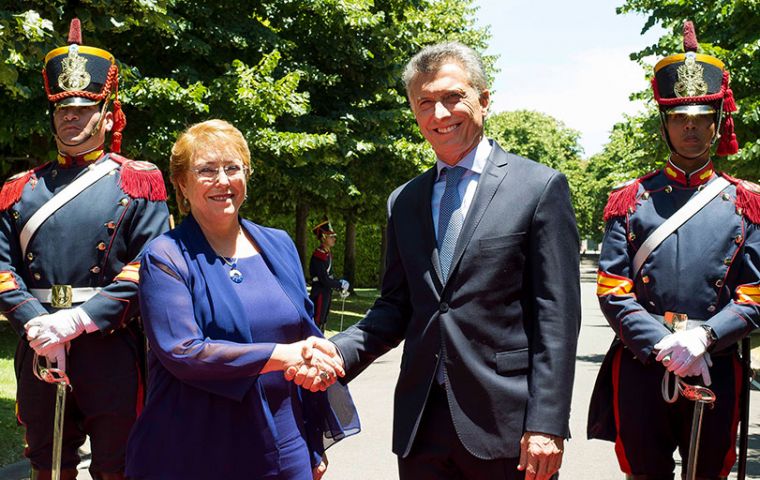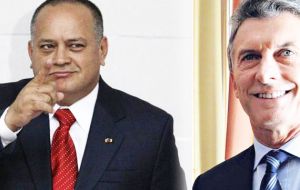MercoPress. South Atlantic News Agency
Macri's Argentina back from world isolation except from Venezuela and Iran
 President Macri meet his counterpart Bachelet in his presidencial residence
President Macri meet his counterpart Bachelet in his presidencial residence  President Mauricio Macri hits back at Venezuelan lawmaker Diosdado Cabello. Who's the most coward of them all?
President Mauricio Macri hits back at Venezuelan lawmaker Diosdado Cabello. Who's the most coward of them all? Argentine President Mauricio Macri said Friday that “we have come from years of isolation and bad relations with almost all countries except Venezuela and Iran.” He added that “this year we have experienced a Copernican change in that sense.”
Macri made those remarks during a joint press conference following a meeting with his Chilean counterpart Michelle Bachelet at the Olivos presidential residence in the outskirts of Buenos Aires. “Ties between countries go beyond their governments,” he added.
He also took a minute to reply to Venezuelan politician Diosdado Cabello, who Thursday called him a “coward” for the alleged attack against foreign minister Delcy Rodríguez during an unofficial trip to Buenos Aires for a Mercosur meeting to which she had not been invited -- unlike the other Mercosur foreign ministers -- in view of Venezuela's suspension from the bloc.
“What is really cowardous is to subject the people in such a way, with restrictions on freedom of expression and so many other things,” Macri stressed as he downplayed the incident involving Rodríguez as a “minor issue.”
For her part, Bachelet called for respect for the “sovereignty of the Venezuelan people” to solve their problems, but she was confident of the efforts being made by the Vatican.
Both presidents also explained that they had reached a better understanding to further simplificate the migration process between the two countries and improve connectivity from Aguas Negras passage and others passages along the border.
Bachelet also spoke about the ongoing project of creating integrated tourist circuits to attract visitors from all over the world, “especially from China.”
“We are not only united for an extended border, we have many reasons to share,” Bachelet admitted.




Top Comments
Disclaimer & comment rules-

-

-

Read all commentsSo reekie, you are finally starting to understand that Argentina's problems are caused by Argentine institutions? That the country's resistance to corrective measures will keep the economy in the dumps and accelerating toward its regularly scheduled next default. And that no matter what government is fouling the Pink House, that the country is going to be screwed. It is encouraging to see that you have finally come to acknowledge that.
Dec 18th, 2016 - 11:45 pm +5A fact believed and perpetuated by a certain class of Argentino's. Do you live in Argentina also?
Dec 17th, 2016 - 04:39 pm +4And Argentina was doing so well under CFK, paying 9.4% on loans from Venezuela when Chile was paying 3.2 % for its debt.
Dec 17th, 2016 - 09:41 pm +4From the leftist media:
“ ......[under CFK] protectionist policies in Argentina destroyed the very agricultural and manufacturing heartland they were intended to help. The aim was to become self-reliant on domestic production and penalize those who exported or imported goods. Soy export tariffs, for example, eventually reached 50 percent, terminally crippling the crown jewel of Argentina’s once thriving agricultural sector.By the same token, import restrictions started small-scale trade wars, and by 2015 trade conflicts erupted with more than 40 different countries. This left the domestic agricultural and manufacturing sectors in disarray. As recently as 2002, Argentina had a trade surplus of 16 percent of gross domestic product, but after more than a decade of protectionism, the entire surplus was erased, and 2015 ended in a deficit. Second, looking for easy sources of growth and debt financing, the government turned to the central bank. Destroying its supposed independence, the government influenced it to aggressively loosen policy. The result: Inflation exceeded 40 percent, hurting growth instead of helping it.Third, oppressive regulations strangled the private sector. The government began controlling things like the price of gas, the value of the exchange rate and nationalization of the private pension system. Artificially distorted prices at first led industry to stop new investment and, later, to stop production altogether. Huge shortages developed. For example, although Argentina has significant natural energy resources, government regulation created huge energy deficits because artificially set prices and burdensome regulation made private investment completely infeasible... the government eventually ran out of money with little to show for its largess, as average annual G.D.P. growth was a meager 0.3 percent between 2011 and 2015.”
Commenting for this story is now closed.
If you have a Facebook account, become a fan and comment on our Facebook Page!